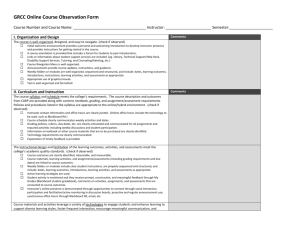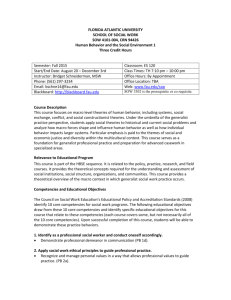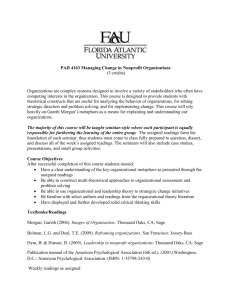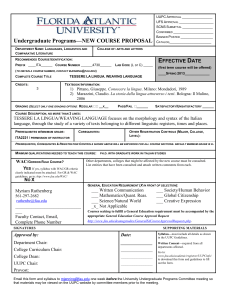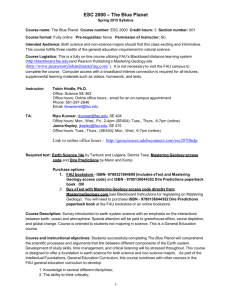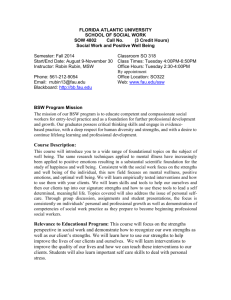EICP Syllabus Template
advertisement
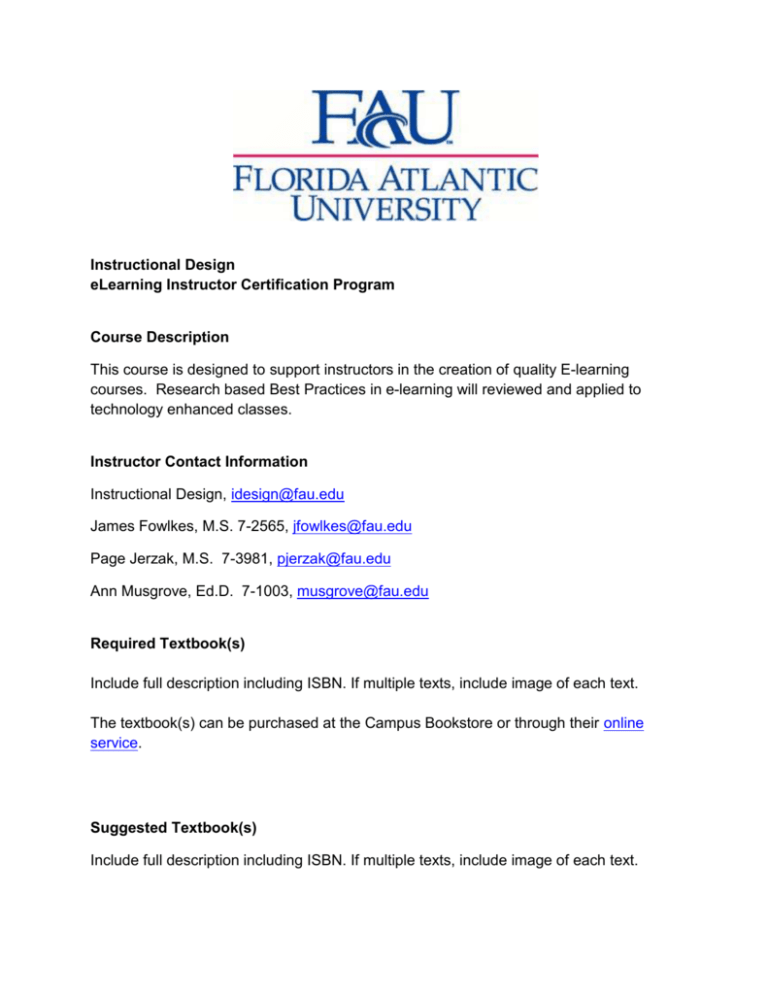
Instructional Design eLearning Instructor Certification Program Course Description This course is designed to support instructors in the creation of quality E-learning courses. Research based Best Practices in e-learning will reviewed and applied to technology enhanced classes. Instructor Contact Information Instructional Design, idesign@fau.edu James Fowlkes, M.S. 7-2565, jfowlkes@fau.edu Page Jerzak, M.S. 7-3981, pjerzak@fau.edu Ann Musgrove, Ed.D. 7-1003, musgrove@fau.edu Required Textbook(s) Include full description including ISBN. If multiple texts, include image of each text. The textbook(s) can be purchased at the Campus Bookstore or through their online service. Suggested Textbook(s) Include full description including ISBN. If multiple texts, include image of each text. The textbook(s) can be purchased at the Campus Bookstore or through their online service. Computer Requirements Operating System A computer that can run Mac OSX or Win XP or higher Peripherals Headphones or speakers Microphone (optional) Software Software downloads when available are linked below. Microsoft Office (2010 for Windows/2011 for Mac) or higher; or Open Office 2 or higher Adobe Acrobat Reader at or above version 9 Flash player 7/8 or higher Windows media player 10 or higher Quicktime player 7 or higher Real player 10 or higher Java 6 or higher Anti-virus software (AVG Free) Adware scanner (Ad-Aware Free) Internet Browsers (at least one from the list below) o Internet Explorer 7 or higher o Firefox 3 or higher If you do not have access to a computer, or if you experience technical difficulties with yours, you can use the campus open labs. Please see Open Computer Labs - Location and Hours. Other Equipment Requirements List any other required equipment along with resources to obtain them. Course Learning Objectives Identify and explain advantages and disadvantages of eLearning. Recognize student needs and characteristics related to learning. Choose appropriate learning theories and design models for the course. Clarify expectations for students in the areas of acceptable work and behavior. Develop learning objectives relating to content and processes relevant to the course. Create learning objectives for each course module. Recognize and accommodate student learning styles. Develop a clear framework and layout for the course. Create a functional course syllabus. Clarify expectations for students in the areas of acceptable work and behavior. Choose appropriate learning theories and design models for the course. Clarify expectations regarding academic integrity. Manage copyright and intellectual property issues for the course. Identify and implement university or programmatic policies and procedures. Appraise and use varied technologies relevant to the course. Recognize and accommodate student learning styles. Recognize student needs and characteristics related to learning. Manage copyright and intellectual property issues for the course. Select appropriate content delivery methods to support selected learning topics. Create innovative and useful content for the course. Create learning activities for each course module. Align objectives, activities, assessments, and technologies throughout the course. Incorporate active learning techniques to support learning objectives. Provide multiple opportunities for prompt feedback to foster learning. Clarify expectations regarding academic integrity. Manage copyright and intellectual property issues for the course. Develop overall assessments for the course. Incorporate active learning techniques to support learning objectives. Develop assessments relevant to learning activities in each course module. Provide multiple opportunities for prompt feedback to foster learning. Appraise and use varied technologies relevant to the course. Recognize and accommodate student learning styles. Recognize student needs and characteristics related to learning. Align objectives, activities, assessments, and technologies throughout the course. Upon successful completion of this course, students should be able to: 1. _____ 2. _____ 3. _____ 4. etc. These must include the course learning objectives from the master syllabus, but additional ones may be added. Course Policies General comments Online courses afford students flexibility by allowing them to complete work around their own personal schedule. Online courses require that the student exercise self-discipline by completing the required assignments on time and without regular reminders. Email policy Only use the Message feature within the course when emailing your professor. Except for Saturdays, Sundays and holidays, your professor will respond to messages within 24 hours. Such messages should only be used to communicate personal issues you do not wish others to read or that you think need personal attention; otherwise, use the FAQ discussion board. Course-related questions Post course-related questions to the FAQ discussion board. Asking course-related questions in this way allows other students with the same question to benefit from your professor’s responses. Also, make sure you review this forum prior to posting a question; it may have already been asked by another co-learner. Except Saturday, Sunday and holidays, questions will be answered by your professor within 48 hours. Announcements You are responsible for reading all announcements posted by your professor. Check the announcements each time you login to be sure you have read all announcements posted since your last login session. Grading Policy College credit courses will receive a letter grade, A through F. The meaning of letter grades: “A” is given only for excellent work. “B” is awarded for good work. “C” is fair or satisfactory work. “F” is unsatisfactory or failing. Students must complete the following assignments: [Provide a complete listing of all assignments with a brief description of each] [Complete a table describing the assignment grade distribution in either points and/or percentage of the final grade] The following grade scale will be used to determine your semester grade: Grade Points A 90-100 B 80-89 C 70-79 F Below 70 Attendance Though the course is delivered online, you are expected to attend (online participation) at least two times per week to ensure you do not miss pertinent postings, messages, and announcements. Failure to meet this obligation may be viewed as course abandonment, and you will be dropped from the course. Orientation Quiz In order to begin a course, students must demonstrate that they have read the syllabus and understand the course navigation and the expectations required of them by completing and passing an orientation quiz. Exam Proctor Policy Online courses may require students to take exams administered by a proctor. If you are unable to utilize the campus proctor services, a proctor can be mutually arranged with the instructor. Approved proctors can be employers, instructors from a local institution, members of the clergy, etc. The student must submit the Proctor Approval Request Form to the instructor. This form will explain what is required of the proctor and require his or her signature indicating acceptance of the responsibility. The student must mail or hand deliver the Proctor Approval Request to the instructor at Instructor’s Name, Instructor’s Address. Download the Proctor Approval Request Form Technical Problem Resolution Policy In the online environment, there is always a possibility of technical issues, i.e., lost connection, hardware or software failure. Many of these can be resolved relatively quickly, but if you wait to the last minute before deadlines, the chances of these "glitches" affecting your grade are greatly increased. Please plan appropriately. Should a problem occur, it is essential you take immediate action to document the issue so your professor can verify and take appropriate action regarding a resolution. Please take the following steps should a problem occur: If you can, make a "print screen" of the monitor when the problem occurred. 2. Complete a Blackboard support ticket. See Blackboard Support for instructions on the FAU’s Blackboard Homepage. If Blackboard is unavailable, you can reach the Help Desk directly at http://www.fau.edu/helpdesk. Make sure you complete 1. 3. 4. 5. 6. the form entirely so the Help Desk staff will have all pertinent information so they can assist you. Sent a message within Blackboard to your professor to notify him/her of the problem. Include all pertinent information of the incident. If you do not have access to Blackboard, sent an email to your professor with all pertinent information of the incident. If you do not have access to a computer, call your professor with all pertinent information of the incident. If he/she is not available, make sure you leave a detailed message. If you do not hear back from the Help Desk or your professor within a timely manner (48 hours), it is your responsibility to follow up. Assignment submission policy All assignments must be submitted through the designated method (forums, drop boxes, etc.). No assignments will be accepted via email. Forum Expectations Module Forums are graded discussions. Your posts must be professional, well organized, grammatically correct and free of misspellings. Additionally, any content quoted, paraphrased, or gleamed from references must be properly cited (see Plagiarism and MLA/APA format below). Interaction is a substantial portion of your grade. Each module forum requires at least 3 posts to receive full credit. The posts should be entered directly into the forum, not in the form of an attachment. Attachments should be held to a minimum and only if needed for illustration - like a chart, image, or table. The first post will serve as your original post in reply to the topic and must be 250500 words in length and must be posted no later than midnight on Thursday, in order to allow sufficient time for co-learners to response. The remaining two posts are to be responses to other co-learners' posts. These must be at least 100 words in length and must be posted no later than midnight on Sunday. They must contribute to the conversation through supportive addition or critique. When the responses are of the latter, they must argue the issue, never the author. The Forum Grading Rubric will serve as a guide. Written Submissions These submissions are written assignments that are submitted via an assignment drop box. Again, they must be professional, well organized, grammatically correct and free of misspellings. Additionally, any content quoted, paraphrased, or gleamed from references must be properly cited (see Academic Integrity and Citing Sources below). All written assignments should be in rich text format (.rtf) to ensure they can be opened easily by your professor. Submissions that cannot be opened will not be graded. Netiquette Due to the casual communication common in the online environment, students are sometimes tempted to relax their grammar, spelling, and/or professionalism; however, remember you are now in a college level course. Such communication is not appropriate here. Maintain your professionalism at all times. Also, please note that in the online environment you do not have the advantage of voice inflection or gestures. As a result, sarcasm can come across very negative, so this form of communication should not be used. Academic Integrity As members of the FAU community, students are expected to be honest in all of their academic coursework and activities. Academic dishonesty, such as cheating of any kind on examinations, course assignments or projects, plagiarism, misrepresentation and the unauthorized possession of examinations or other course-related materials, is prohibited. Plagiarism is unacceptable to the college community. Academic work that is submitted by students is assumed to be the result of their own thought, research or selfexpression. When students borrow ideas, wording or organization from another source, they are expected to acknowledge that fact in an appropriate manner. Plagiarism is the deliberate use and appropriation of another's work without identifying the source and trying to pass-off such work as the student's own. Any student who fails to give full credit for ideas or materials taken from another has plagiarized. Students who share their work for the purpose of cheating on class assignments or tests are subject to the same penalties as the student who commits the act of cheating. When cheating or plagiarism has occurred, instructors may take academic action that ranges from denial of credit for the assignment or a grade of "F" on a specific assignment, examination or project, to the assignment of a grade of "F" for the course. Students may also be subject to further sanctions imposed by the judicial officer, such as disciplinary probation, suspension or dismissal from the College. Students may also be subject to further sanctions imposed by a judicial officer, such as disciplinary probation, suspension or dismissal from the College. Please view the complete Academic Integrity Policy Citing Sources Papers written for this course will be required to be in MLA/APA format. The library has reference material for the MLA/APA style or you can use one of the following: List of recommended MLA/APA style resources with hyperlinks when available. Research Initiative As part of FAU's ongoing quality assurance plan, samples of student performance such as test results, projects, papers, etc. may be used. The data gathered will not identify individual students and is not related to the student’s grade for the course, but will be used to improve student learning at FAU. Accommodations Any student with a documented disability which may require special accommodations should self-identify to the instructor as early as possible in order to receive effective and timely accommodation. If you have any questions about accommodations for a disability, please contact the Office for Students with Disabilities (OSD). The OSD office http://www.osd.fau.edu/ at FAU offers college constituents equity and excellence in education. By working with students, as well as faculty and staff members, on all FAU campuses, OSD ensures that appropriate academic adjustments are made to allow all students equal opportunities online, inside the classroom and around campus. Other Policies and Resources Non-Discrimination Statement Add/Drop Policy E-Learning Library Freshman Advising Center for Leaning and Student Success Tutoring FAU Catalog Blackboard is committed to accessibility in education. See http://www.blackboard.com/TeachingLearning/Learn-Resources/Accessibility.aspx for further information on how Blackboard continues its work toward this goal. Orientation Learning Materials Assignments & Assessments Due XXX Quiz - Orientation Discussion - Introduction Assignment –Scavenger Hunt Unit1 Basic Concepts of eLearning Pros/Cons Identify and explain advantages and disadvantages of eLearning. Learning Materials Assignments & Assessments Characteristics of Participants Recognize student needs and characteristics related to learning. Learning Theories Choose appropriate learning theories for the course. Design Models Choose appropriate design models for the course. Read Chapter 1 in your text and Chapter 1 Lesson in the Lessons folder on your Course Homepage Post to discussion 1/Due____ Self -Assessment due Online quiz due ________ Goals and Objectives Create learning objectives for each course module. Learning Styles Recognize and accommodate student learning styles. Unit 2 - Creating the Course Framework Learning Environment Develop a clear framework and layout for the course. Syllabus Create a functional course syllabus. Orientation Clarify expectations for students in the areas of acceptable work and behavior. Unit/Module OrganizationChoose appropriate organizational design for the course. Policies and Legal IssuesClarify expectations regarding academic integrity. Manage copyright and intellectual property issues for the course. Identify and implement university or programmatic Learning Materials Assignments & Assessments policies and procedures. Unit 3 – Creating the Learning Materials Course Material Instructional Technologies Appraise and use varied technologies relevant to the course. Recognize and accommodate student learning styles. Recognize student needs and characteristics related to learning Content Delivery Manage copyright and intellectual property issues for the course. Select appropriate content delivery methods to support selected learning topics. Create innovative and useful content for the course. Create learning activities for each course module. Align objectives, activities, assessments, and technologies throughout the course. Active Learning Techniques Incorporate active learning techniques to support Assignments & Assessments learning objectives. Communication Provide multiple opportunities for prompt feedback to foster learning. Unit 4 - Creating Course Assessment/Evaluation Academic Integrity Assessment of Learning Assessment of Course Evaluation Alignment Learning Materials Assignments & Assessments


